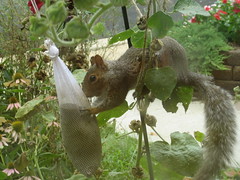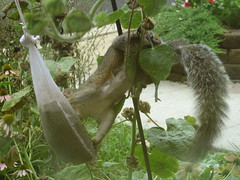The feature article in the NY Times Magazine this week is titled “The Squirrel Wars.” It’s about the efforts to rid the U.K. of non-native gray squirrels, who are a threat to the native red squirrel population.
The situation has now reached a crisis point: there are only an estimated 160,000 red squirrels left in Britain, whereas there are more than 2 million grays. Without human intervention, reds could be gone from England in 10 years. The red squirrel is a national icon, and the British government is trying hard to save it. Deliberately killing a red squirrel or disturbing its nest, called a drey, is a crime. Last year the government set up more than a dozen refuges for red squirrels in the north of England. The country’s National Lottery granted £626,000 to a group called Save Our Squirrels to run the reserves. Save Our Squirrels, or S.O.S., is a who’s who of British conservation organizations, among them the Mammals Trust and Natural England. It has a toll-free number for reporting sightings of grays and reds and works to raise public awareness of the red’s plight.
The piece is as focuses on the efforts of one nascent group, the Red Squirrel Protection Partnership, as well as summarizing the social history of the red squirrel in the U.K.
But over time the red squirrel became beloved in Britain. It supplanted the realm’s old icon, the lion, as the symbol of a gentler, more evolved nation. There was Squirrel Nutkin, Potter’s irreverent playful red, and also Tufty Fluffytail, the Safety Squirrel, a public-service creation whose warnings about danger on the road began in the early 1950s and lasted until the ’80s. As the red rose in popularity, the gray sank in public esteem. Potter’s attempt to follow up Squirrel Nutkin with a story about a gray squirrel, Timmy Tiptoes, did not achieve the same success. In 1922, a government permanent secretary was quoted in The Times of London calling grays “sneaking, thieving, fascinating little alien villains.”
I almost missed the article entirely, which would have been funny since it’s not just an article about problematic squirrels, it’s an article about problematic squirrels written by a neighbor.

